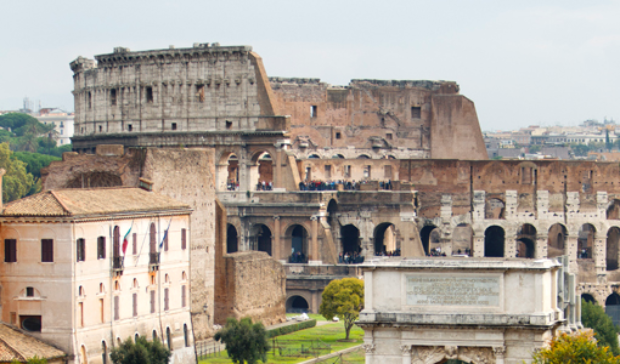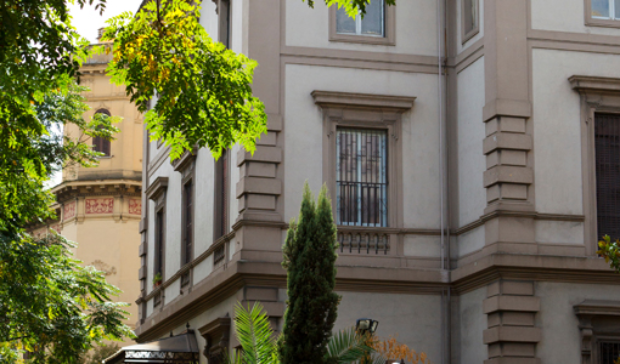It’s Sunday night. The Catholic Studies students studying in Rome are finishing a meal together in the lower level of the Bernardi Campus. As the meal comes to an end, campus director Thanos Zyngas and two young men from St. John Vianney Seminary slip into the kitchen. They emerge with a cake, and everyone sings “Happy Birthday” to Adam, a seminarian. Someone starts chanting, “Skip around the room! Skip around the room!” Soon everyone has joined in, and Adam obliges with a few giant skips.
It’s Tuesday morning at the Angelicum. Dr. Thomas Sullivan, this semester’s faculty in residence, has given his class a break midway through his first lecture of the year. He has just defined natural theology and revealed theology and has asked the students to think about essential propositions of the Catholic Church that are not revealed theology. Some students stand in a group, discussing doctrine; one woman asks another about her injured foot; one student rests his head on his desk; a group goes off in search of coffee.
It’s Wednesday evening. The students are gathered in the Bernardi Campus chapel for Mass. A newly ordained deacon gives a homily, nervously at first and then with increasing confidence. Following Mass, the students talk about the homily with enthusiasm as they move to the living room, ready to discuss editorials on Archbishop Nienstedt’s recent DVD on marriage.
About a month after classes have begun for St. Thomas students in Minnesota, Catholic Studies students who are in Rome for the fall are finally beginning their classes. Most of them arrived only a week earlier, and they were given a whirlwind orientation. Already these students, some of whom had never met and many of whom are new to Rome, are bonding and learning the ways of their new city. They know that Zach is happy to serve others by polishing off their leftovers; that Mrs. Sullivan will be their mom away from home, surprising a group of them with brownies when someone mentions “brownie points”; that when crossing a street amidst oncoming motor scooters, they should continue at the same pace to avoid being hit.
Rome, the Wonderful TeacherStudents in the program range from sophomores to graduate students; most are juniors. The majority stay for one semester, though a few stay for a year. In the fall, as is the case this year, there are often many more seminarians than lay men and women, but in the spring there is usually more of a balance between these three groups of students. Many decide to come to Rome after hearing about the program from others. Senior Alice Biver, a health education major and Catholic Studies minor, is one of the students who came after being encouraged by others. “I was told, ‘Don’t debate it; just go.’” Being in Rome brings her a new sense of perspective. “I grew up in Rice Lake, Wis. The Catholic community in which I grew up wasn’t big, and Rice Lake wasn’t a Catholic town but more Lutheran. In a small town, you don’t see how universal the Catholic Church is.”
Senior Burton Hendrickson, Catholic Studies major and philosophy minor, said, “I wanted to know more about the world, to understand the world better. There’s only so much you can learn from a page. Rome stretches us.” Valuing both breadth and depth, he said of his plans to experience Rome, “I don’t want to get in a rut. I want to eat in different places and see different neighborhoods. I also want to revisit some places, to let them soak in.”
The Academic Component: Classes at the AngelicumFather Charles Morerod, O.P., is rector of the Angelicum and director of the academic program for the students while they are in Rome. “While students are here,” he said, “they have the opportunity to discover Rome as a place of faith and culture and as the center of the international life of the Church.” Part of the international life can be found among the Angelicum’s other students. Although some classes that St. Thomas students take are exclusively for them, they also have opportunities to attend classes with Catholics from around the world.
Undergraduate students in St. Thomas’ Rome program take many of the same courses. This semester, students are taking “Church and Culture: Social Dimensions of Catholicism,” taught by Dr. Sullivan; “Church and Culture in Italy,” an art and architecture course taught by Dr. Elizabeth Lev; “Spiritual Theology,” taught by Father Paul Murray, O. P.; and “Conversational Italian.” Students take an elective, either “History of Modern Philosophy,” taught by Father Joseph d’Amécourt, O.P., or “Introduction to Patristic Teaching,” taught by Father Edmund Ditton, O.P. Some students are taking additional electives, such as Latin or metaphysics.
Allison Koop, a CSMA graduate student, has more freedom in her choice of classes, though she is attending some Italian classes and also is taking Dr. Lev’s course with the undergraduate students. “There is no way you could take this art class at home. You can see slides, but it’s a different experience seeing it live.”
Dr. Lev, who gives frequent tours at the Vatican and also teaches art history students from Duquesne University in Rome, teaches one class each semester to students from St. Thomas’ Catholic Studies program. Her class travels to different sites, absorbing Catholic art and architecture; this semester these sites have included the catacombs, the Vatican Museums, the Scavi below St. Peter’s Basilica, the Basilica of St. John Lateran, the Basilica of St. Mary Major and Santa Maria in Trastevere. She appreciates that Catholic Studies students come into her class with a shared knowledge that allows her to discuss art more profoundly. “Art assumes a certain knowledge, such as knowledge of Bible stories. Catholic Studies students share a sense of what an altar is for and know the story of the Annunciation. This offers more possibilities to delve into deeper aspects of images.”
The Uniqueness of a Christian Community“It’s no exaggeration to say that the community of faculty, family and students is a remarkable experiment in Christian community,” said Dr. Coulter. “We study, travel, play and pray together for an intense period of months. That forges deep friendships among students as well as between faculty and students.”
This “experiment in Christian community” is unique not just for the way it can bring together faculty and students but also for the way it mixes seminarians with lay students. Seminarian Michael Bower, a junior majoring in Catholic Studies and philosophy and minoring in Latin, said that the community aspect allows him to learn to relate to women as a seminarian, in a way he did not prior to college. Father Morerod also sees this as a benefit of the program. “It can be useful to mix lay students and seminarians together. Both can discover how the others really are.” There are separate floors for men and women and a distinct formation program for seminarians.
Bower was impressed by how quickly a sense of community formed within the Bernardi Campus. After the first week on campus, some students chose to take a trip to Assisi. “I had a ‘homey’ feeling when I got back to campus,” he said. Junior Mitchell Welle, a philosophy major and Catholic Studies minor, attributes this rapid formation of community to the students’ common life and goals. “I hope we can learn from each other as we pursue what’s true together.”
While each semester’s faculty in residence is in Rome to foster students’ intellectual lives, he or she also finds ways to simply enjoy living with the students. Dr. Sullivan, for example, makes it his priority to get together with the students in small groups and individually. “I might have a gelato with one, share a taxi to class with another, or have a small group to my apartment. I get to know students much better this way. I’m still in touch with a group from my first trip to Rome. My wife and I had 18 of them to our home last summer.” Since his first teaching trip to Rome, he has brought this practice of getting to know his students individually to his classes in St. Paul. “I wish I’d done it all of my career,” he said.
Growing in Faith in the Heart of the ChurchAs both Welle and Dr. Coulter noted, it is their shared faith that makes this community particularly close, and spiritual growth is a part of the Rome program. On Monday nights the students split into groups – seminarians, lay men and women – to meet for spiritual formation. On Wednesday nights, they have the opportunity to worship together, discuss a topic relevant to their faith or meet with a special guest, and share a meal. Past guests have included Ambassador Mary Ann Glendon, Cardinals Stafford and Schonborn, and George Weigel. All students engage in apostolic outreach, whether serving homeless men at the Missionaries of Charity, gardening for the Little Sisters of the Lamb or working directly with street people in Rome. Sophomore Mary Burns, who will stay in Rome for the full academic year, noted that the apostolic outreach is an opportunity to serve the people in the city where she now is living. The students have a weekend silent retreat outside of Rome. In addition, lay students have the opportunity to join the seminarians in their daily times of prayer. Said Biver, “I grew up Catholic in name, but I wasn’t practicing in the sense I am now. I’m growing into a more structured routine with the help of others. It makes the day go by smoothly.”
This unique aspect of growth that can’t be found in many other study abroad programs naturally comes up in conversations with students about their goals and reasons for coming to Rome. Said Burns, “I want to learn and to grow in my faith. I want to love others more fully.”
Luke 2:52 summarizes Jesus’ boyhood growth in this way: “And Jesus advanced in wisdom and age and favor before God and man.” This ideal for growth is an ideal pursued by the Catholic Studies program in Rome: Students should be growing intellectually, in faith and in their relationships with others.
Father Joseph Carola, the campus chaplain, emphasized the importance of this growth. “I tell students, ‘You will not be the same person you are now when you leave.’ Out of this experience, they will make major decisions that will affect the rest of their lives.”







